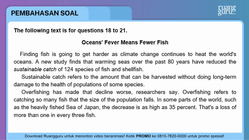Iklan
Pertanyaan
The following text is for questions 18 to 21. Oceans' Fever Means Fewer Fish Finding fish is going to get harder as climate change continues to heat the world's oceans. A new study finds that warming seas over the past 80 years have reduced the sustainable catch of 124 species of fish and shellfish. Sustainable catch refers to the amount that can be harvested without doing long-term damage to the health of populations of some species. Overfishing has.made that decline worse, researchers say. Overfishing refers to catching so many fish that the size of the population falls. In some parts of the world, such as the heavily fished Sea of Japan, the decrease is as high as 35 percent. That's a loss of more than one in every three fish. Researchers examined changes in 235 populations of fish and shellfish between 1930 and 2010. Those fish populations were scattered across 38 ocean regions. Temperature changes vary from one ocean site to another. But on average over that time, Earth's sea-surface temperatures have risen by about half a degree Celsius (0.9 degree Fahrenheit). On average, that warming has caused the sustainable catch to drop by 4.1 percent, the study found. About 8 percent of the fish and shellfish populations the team saw losses as a result of the ocean warming. About 4 percent of the populations increased. That's because certain species have thrived in warmer waters. One example is the black sea bass. It dwells along the northeastern U.S. coast. But as warming continues, even these fish will reach their limit, says Christopher Free. He works at the University of California, Santa Barbara. He led the work while he was at Rutgers University in New Brunswick, N.J. About 3.2 billion people worldwide rely on seafood as a source of food. That means it's urgent for commercial fishing fleets and regulators to consider how climate change is affecting the health of all of those fish in the sea. (Adopted from: https://www.sciencenewsforstudents.org/article/oceans-climate-change-means-fewer-fish (April 6, 2019)) What is the purpose of the text?
The following text is for questions 18 to 21.
Oceans' Fever Means Fewer Fish
Finding fish is going to get harder as climate change continues to heat the world's oceans. A new study finds that warming seas over the past 80 years have reduced the sustainable catch of 124 species of fish and shellfish.
Sustainable catch refers to the amount that can be harvested without doing long-term damage to the health of populations of some species.
Overfishing has.made that decline worse, researchers say. Overfishing refers to catching so many fish that the size of the population falls. In some parts of the world, such as the heavily fished Sea of Japan, the decrease is as high as 35 percent. That's a loss of more than one in every three fish.
Researchers examined changes in 235 populations of fish and shellfish between 1930 and 2010. Those fish populations were scattered across 38 ocean regions. Temperature changes vary from one ocean site to another. But on average over that time, Earth's sea-surface temperatures have risen by about half a degree Celsius (0.9 degree Fahrenheit).
On average, that warming has caused the sustainable catch to drop by 4.1 percent, the study found. About 8 percent of the fish and shellfish populations the team saw losses as a result of the ocean warming. About 4 percent of the populations increased. That's because certain species have thrived in warmer waters. One example is the black sea bass. It dwells along the northeastern U.S. coast.
But as warming continues, even these fish will reach their limit, says Christopher Free. He works at the University of California, Santa Barbara. He led the work while he was at Rutgers University in New Brunswick, N.J.
About 3.2 billion people worldwide rely on seafood as a source of food. That means it's urgent for commercial fishing fleets and regulators to consider how climate change is affecting the health of all of those fish in the sea.
(Adopted from: https://www.sciencenewsforstudents.org/article/oceans-climate-change-means-fewer-fish (April 6, 2019))
What is the purpose of the text?
To describe sustainable fishing to the readers.
To pinpoint the need of a new fishing regulation.
To present newsworthy information to the readers.
To provide information about the safe limit of fishing.
To give insight about the effect of climate changes on the oceans.
Iklan
R. Rani
Master Teacher
4
3.0 (1 rating)
Iklan
Pertanyaan serupa
RUANGGURU HQ
Jl. Dr. Saharjo No.161, Manggarai Selatan, Tebet, Kota Jakarta Selatan, Daerah Khusus Ibukota Jakarta 12860
Produk Ruangguru
Bantuan & Panduan
Hubungi Kami
©2026 Ruangguru. All Rights Reserved PT. Ruang Raya Indonesia

















